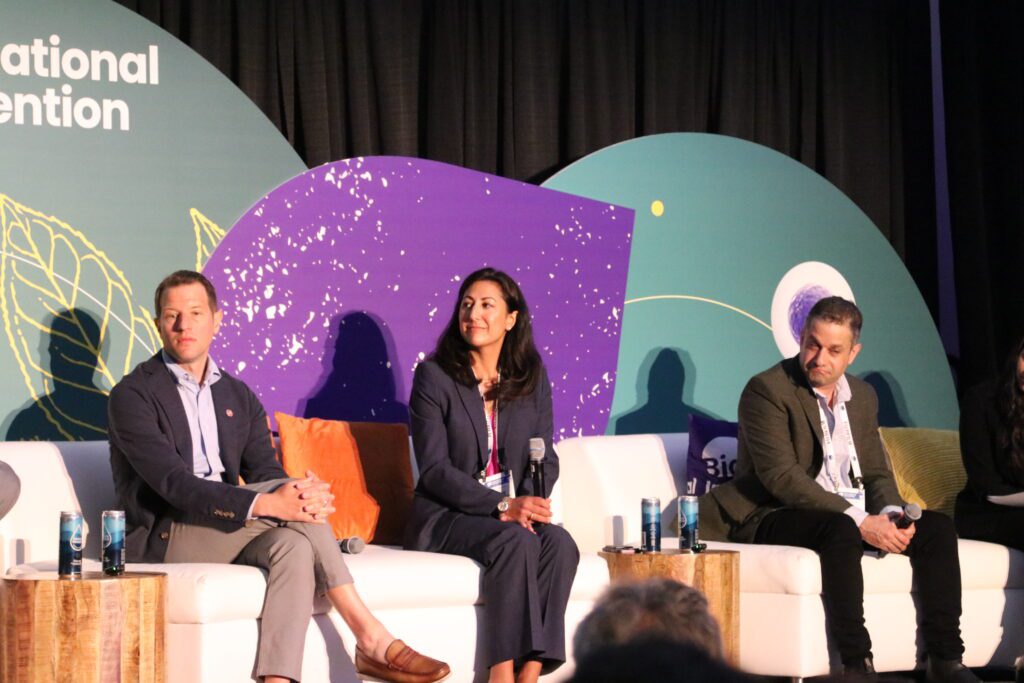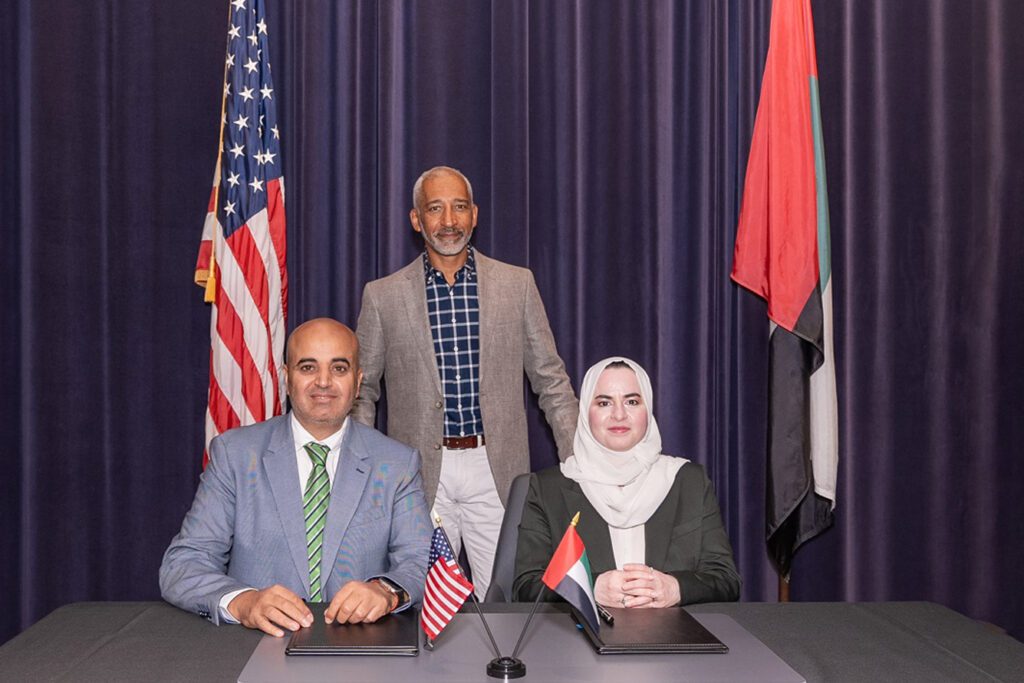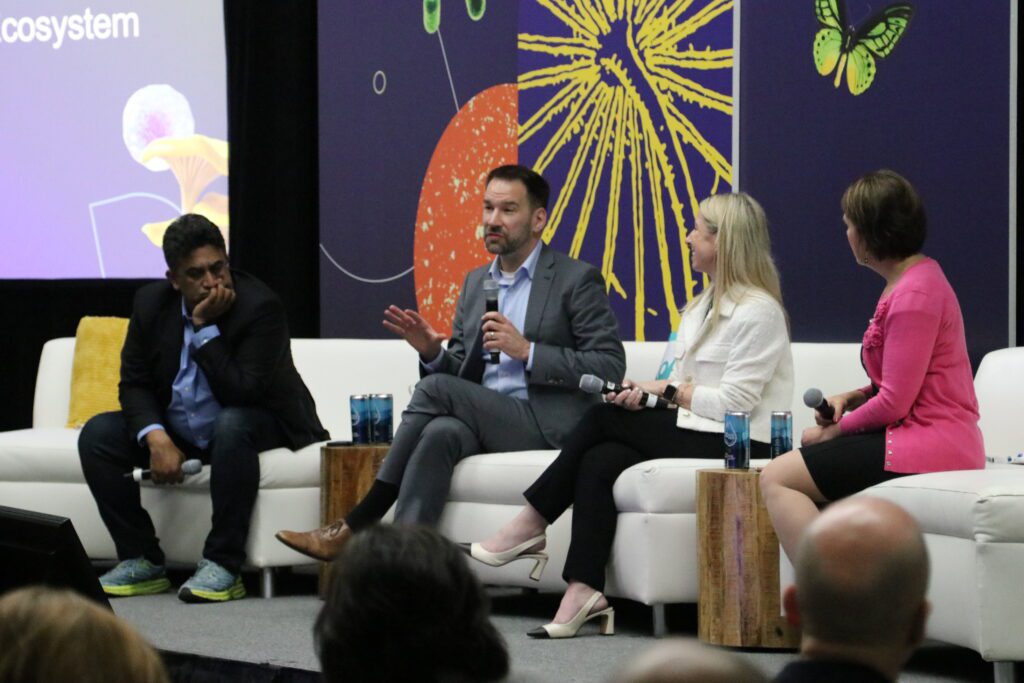From oncology to AI to burgeoning biotech hubs worldwide, the 2024 BIO International Convention brought together the global biotech community to discuss key trends and offer valuable business insights. We had the chance to attend various panels and speak with participants about what’s happening in the biotech business ecosystem, and get the inside scoop on partnering opportunities. Here are five things we learned.
1. Don’t ignore AI.
The acronym on everyone’s lips: AI, which is driving a transformative shift in drug discovery and development, as speakers from AstraZeneca, Johnson & Johnson, InSilico Medicine, and Envisagenics discussed during a June 4 panel, AI’s Trial By Fire: Experimental Validation in Drug Discovery.
Standard drug discovery involves a time-consuming process of generating hypotheses, identifying targets, compound screening, lead optimization, preclinical studies, and clinical trials. Before AI, streamlining the drug discovery process included computational methods such as molecular modeling, QSAR (quantitative structure-activity relationship) models, and virtual screening. These methods were limited by computational power and the complexity of biological systems.

Enter AI, which can leverage vast biological and chemical data to identify potential candidates. Machine learning algorithms analyze data from a variety of sources to predict the efficacy and safety of new compounds, while neural networks can model complex relationships within biological systems, leading to more accurate predictions of how new drugs will interact with targets. AI can also rapidly analyze genetic data and disease pathways, identifying potential intervention points. It can also be used to identify new uses for existing drugs and predict new therapeutic applications for known compounds.
Ensuring the availability and accuracy of datasets can be challenging, as is the concept of utilizing predictions to gain trust and ensure safety, and combining AI with traditional experimental methods to enhance drug discovery. Efforts are underway to improve the transparency and interpretability of AI algorithms and inflate interdisciplinary collaboration to benefit industry practice.
The bottom line? The convergence of AI and experimental validation offers the potential to significantly reduce costs while improving the success rates of new therapeutics.

2. In oncology, consider the ‘impact for patients’ and address unmet need.
Oncology receives more than one-third of venture capital investment and, as of 2021, made up more than 43% of the therapeutic development pipeline. But it’s still a tough market. What does it take for an oncology company to get the attention of a large biopharma?
When meeting with biotechs, Genentech starts “with an early conversation” about the data as well as the company’s goals in development, said Visali Ramanathan, Executive Director, Head of Business Development for Oncology at Genentech, in an interview on June 4.
When prioritizing investments, they think about how they can make the “most impact for patients and accelerate innovation” to address unmet need.
Ramanathan was part of a panel, Joining Forces to Accelerate Innovation in Oncology, sponsored by Genentech and featuring speakers from Merck KGaA and other oncology leaders. The panel explored the key role of partnerships, especially in targeted therapies, cell therapies, and ADCs.
“We are willing to make high-risk, high-reward bets and it’s really in those areas where we can bring unique capabilities to how we accelerate innovation for patients,” she continued in the interview. Watch:
Interview with Visali Ramanathan, Executive Director, Head of Business Development for Oncology at Genentech
3. When it comes to partnerships, think globally.
While the panels capture much of our attention, we love exploring the exhibit floor, which featured three dozen countries from Canada to Switzerland and even Ukraine. (Not to mention all the U.S. states, from biotech behemoths like California and North Carolina to burgeoning bioeconomies like Kentucky.) And we always stop at Abu Dhabi (and not just because the booth looks like a glamorous airline lounge).
We caught up with Dr. Asma Ibrahim Al Mannaei, Executive Director of the Research and Innovation Center at the Department of Health – Abu Dhabi (D0H), and Dr. Mohamed AlAmeri, Section Head of Studies and Special Projects, who told us about their strategy to make Abu Dhabi a premier life science ecosystem for the region and world – and how their innovative thinking about partnerships and regulation can benefit companies and patients.
Abu Dhabi’s strategy includes expanding the Emirati Genome Programme (EGP), which boasts over 500,000 genomes sequenced, making it one of the world’s largest genome programs. An MOU signed with BIO member Novartis at the convention focuses on utilizing Abu Dhabi’s genomics expertise to generate real-world evidence (RWE) in oncology, neurology, and cardiovascular disease. Similarly, another partnership announced with Pfizer seeks to leverage Abu Dhabi’s data capabilities to advance research on sickle cell disease and other conditions. And the precision medicine program, particularly in breast cancer, leverages Abu Dhabi’s unique genetic insights in collaboration with Cleveland Clinic Abu Dhabi to identify gene variants specific to the local population, underscoring the importance of thinking globally when it comes to personalized healthcare.

“We believe enabling the quick and agile regulatory system to make available medication is crucial for growth,” said Dr. Asma Al Mannaei in our interview. This efficiency is facilitated by the comprehensive real-world data collected through the Emirate’s fully connected healthcare system, which allows for rapid decision-making and approval processes.
Abu Dhabi’s partnership with BIO member Roche on spinal muscular atrophy and other rare conditions exemplifies its commitment to improving patient access to life-saving medications. “We would like to position ourselves as part of the solution by enabling the accessibility of our data to create more important policy decisions for better access for the patient,” she explained.
Abu Dhabi’s leaders are actively seeking collaborations with international biotech companies to establish a second home for innovation in Abu Dhabi. Dr. Asma emphasizes the goal of building a bridge rather than competing: “We want to have them in the area as a second home so that they can actually benefit the whole region.” (And we’d say the world.)
4. There’s a clear business case – and health case – for sustainability.
While several panels highlighted agricultural and climate innovations, it’s incumbent upon all companies to take steps to reduce their environmental footprint, because a healthy planet and healthy people go hand in hand, said speakers during a June 4 session, Building a More Sustainable Biopharma Innovation Ecosystem. The panel featured speakers from Gilead Sciences, Corning, and Illumina exploring how upstream and downstream players – suppliers, manufacturers, hospitals, and pharmacies – can work together to identify and enable solutions to healthcare supply chain emissions.

Drug development does include a LOT of materials and resources, including many that cannot be reused at the moment, said Rachel Kaufman, MBA, Head of Global Sustainability at Avantor, in an interview after the panel.
But: “As with everything else, a challenge leads to innovations. And what we’re seeing is collaboration from the customer side to the suppliers to the raw material manufacturers to come together,” she said. This is leading to many interesting recycling solutions, especially with plastics.
“We talk about a healthy planet being good for healthy people — healthy people also create a healthy planet,” she continued. “If you think about somebody on dialysis, they have to go and get treatment — there’s a lot of emissions and material use and resource use that happens, whereas healthier people honestly need less of that.”
Getting everyone in the supply chain engaged is key to making an impact. “It really is across functions that we will achieve great sustainability,” she concluded. Watch:
Interview with Rachel Kaufman, MBA, Head of Global Sustainability at Avantor
5. Don’t miss the opportunity to partner.
A whopping 61,000+ partnering meetings were scheduled during the week – a harbinger of some of the incredible innovations that could be forthcoming.
“This is the place to go globally to meet your needs in terms of both investment and partnerships, as well as trying to grow your company,” said Ali Ardakani, Founder and Managing Director of Novateur Ventures, which participated in partnering.
Participants noted that the convention allows them to get meetings they normally would not be able to secure.
“As we know in this sector, sometimes this takes years and years and years,” said Wendy Hurlbut of Life Sciences BC, which brought British Columbia biotechs to the event. “And we have examples of BC companies that have been coming here for a number of years. Their first connection was made at BIO, and eight years later, their first investment was made, and it was traced back through the partnering meetings that they had had over the years.”
Watch:



